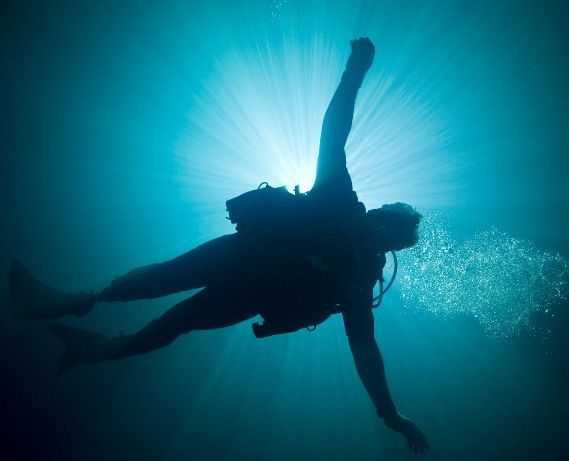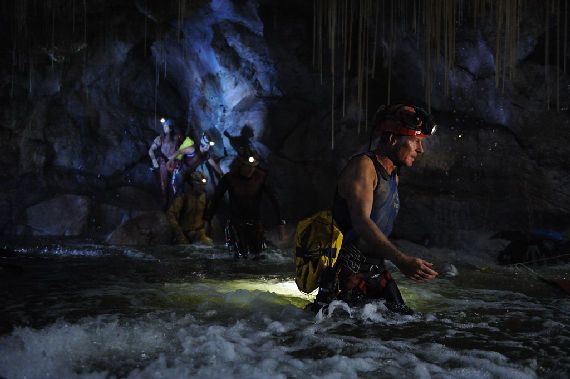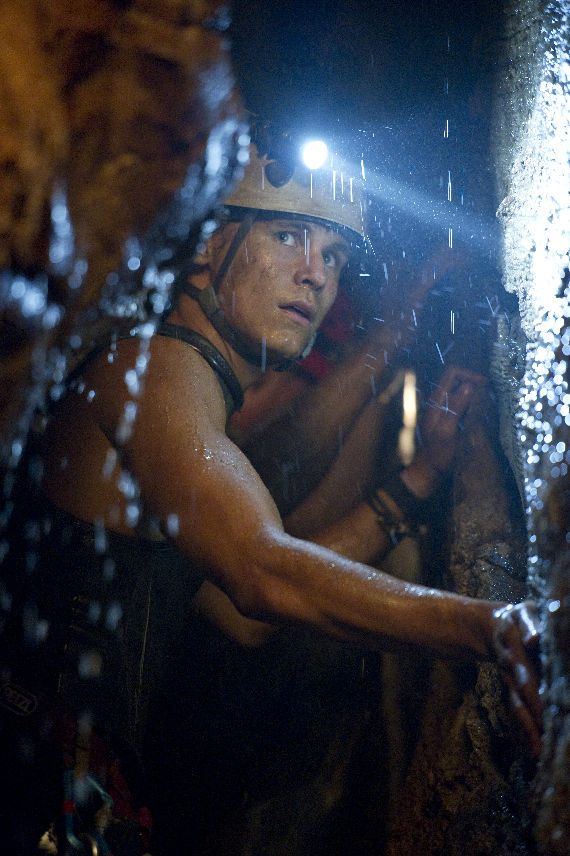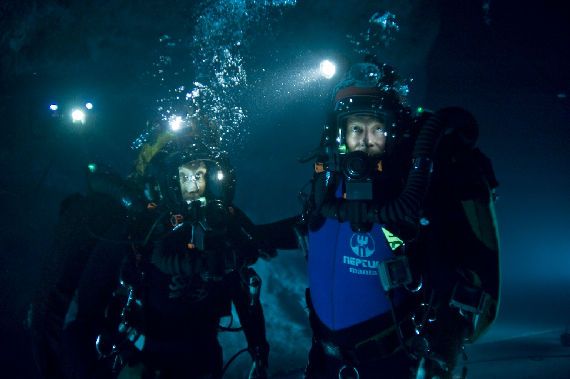Several years ago, while scuba diving in cold and murky waters, I came up against a circumstance that I had been prepared for and yet did not imagine was a legitimate possibility: my respirator failed. After multiple attempts at a correction, I did the one thing you should never do in that position-- I panicked, and tried to swim to the surface.
Just as I was launching myself up, I felt a firm grip on my arm stopping me in my ascent. A master diver had come over to prevent me from either making a dangerously rapid rise, or from taking in a lungful of water in an attempt to catch a breath.
He forced me to look at him and make my climb at an advisable pace, and buddy breath with him so that I was able to do so.
He was what a master diver should be -- calm, assured, steadfast to ruthless in terms of what he knows to be right and safe. He was also a grain-fed, grade a, A-hole. He was gruff, and rude, and arrogant, but this A-hole had just prevented me from doing something incredibly stupid and dangerous.
He was a man not unlike actor Richard Roxburgh's character, Frank, in the 3D underwater, cave-diving thriller Sanctum. In describing his character, Roxburgh says that:
Frank is characteristic of the guys that do this stuff. There is almost a military quality to them, a steely quality. It requires a zen self-discipline, and also the ability, which you kind of see Frank doing, to let practical reality be the terms that dictate things – so if someone is going to weigh you down, then you have to let them go.
The aforementioned “stuff” that Roxburgh is referring to is one of the most dangerous leisure activities a person can engage in: cave diving. Cave divers use specialized scuba equipment to explore cave systems that are, at least in part, submerged underwater. The restrictions, specialized equipment, and the element of the unknown make this an especially perilous pursuit.
Sanctum, the film, is based on an experience that producer/co-writer Andrew Wight had leading a cave diving expedition in Australia when, as he explains, “on the last day a storm flooded the entrance, and fifteen of us were trapped below ground. It took nearly two days to get everyone out, myself included. So, it was in the course of those events, and really staring death in the face and watching how everyone responded that inspired what came to be the 'Sanctum' story.”
Take a look at the behind-the-scenes feature below in which Wight describes his harrowing ordeal:
-
-
In Wight's real-world experience all fifteen were, thankfully, able to make it through alive. The film, however, heightens the stakes both for the sake of the drama, as well as to impart the sense of life's true fragility. In keeping with a sense of reality, executive producer James Cameron assures viewers that “Everything you see (in the film) happened to somebody, somewhere, (though) not all in the same expedition.”
Cameron is no stranger to both high-risk adventuring (he and Wight have done a series of deep sea expeditions together, including exploring both the Titanic and Bismarck ship wrecks) and envelope pushing, and he wanted to accomplish two things with the creation of Sanctum: One, to illustrate that it is possible to shoot 3D effectively and on a reasonable budget; and two, to explore “the psychology of survival.”
How do we react in a life or death situations, what would we do, and what do our responses say about who we are as people?
According to actress Alice Parkinson, who plays Victoria, a character who makes consistently ill-advised choices in the film: “often what we think we would do, is not necessarily what we would do...all kinds of decisions are made in high stress situations.”
In speaking with the press about the film, Cameron stressed that the filmmakers:
Wanted to get into that thing that happens inside people where they have to adjust to a situation where it appears completely hopeless. Some people are able to make that adjustment, others aren’t, some people become more heroic than they could have imagined was possible for themselves, while other people who you think of as leaders can become quite cowardly or could implode. Everyone reacts differently. And I think the appeal of this kind of a movie for audiences in general is to test themselves against the circumstances of the film and think: 'Wow, what would I do if I was in that situation, I can barely breath watching this, let alone actually doing it. Could I hold my breath that long?' I think that's why we have nightmares. Our brain is running simulations to put us in jeopardy – to see what we'll do. Or to acclimatize us to that idea that something bad could happen.
Following my brief moment of breathless claustrophobia while scuba diving, I had a series of nightmares over a period of several days. The dreams were likely an attempt on the part of my subconscious to come to terms with the sense of powerlessness that is inherent in being physically trapped, and confronted with one's own limitations.
Each of the dreams brought me face to face with another potential outcome, another aspect of my fear, and another facet of my inner life, my nature, which is perhaps the most challenging thing to confront.
There were a kaleidoscope of alternating scenarios. In some, I was left alone, unable to breathe, far below the surface with no option but to rush towards an exterior that was too far away to reach. Alternatively, I would be literally bound, as if something was holding me down, forcing me to remain immobile, submerged in my own fear.
Each of these visions was an attempt for my mind to surrender - to reconcile itself to the reality of succumbing to something larger than myself, as all of us ultimately will.
--
Continue reading about the nature of sacrifice and survival...
In a sense, I had felt betrayed by the water. Water had always been a place of refuge for me, a place of quiet and serenity - truly, a sanctum. I knew how to swim before I knew how to walk, and as a girl I would test myself to see how long I could remain immersed, basking in the silence and the serenity I found there.
Although I had always understood water's great power, it was as if I felt entitled to receive the same affection from the water that I felt toward it, and that affection would be demonstrated by never causing me a moment of fear. Some part of me was unconsciously rejecting the very nature of nature; as if it was incomprehensible (at the time) that something that I loved so much, could also so easily kill me.
This was a child’s attitude: the truth is that the water is in itself a gift, owing me nothing, offering everything with its very presence, its existence.
In Sanctum, Frank understands that we are owed nothing from nature, that we are, in fact,“just bits of dust passing through.”
The power and force of the storm that traps the divers creates the potential for the classic “man vs. nature” scenario in the film; yet in Sanctum nature is not the enemy, it is simply the reality that we must accept and do our best to manage.
The other archetypal cinematic relationships represented in the film include “man vs. himself" - which is particularly present in the father/son dynamic between Frank and his son Josh (Rhys Wakefield) - and “man vs. man.”
Both “man vs. man” and “man vs. himself,” are explored in the questions the film raises about the nature of sacrifice. What are you willing to do to survive, and what are you willing to sacrifice to ensure the survival of another?
Scuba diving offers a rare opportunity to engage in what is actually one of the most confronting, and intimate, activities one can participate in with someone who is not a family member, dear friend, or lover – buddy breathing. The level of trust required is exquisite. If you are already in a fearful state, each breath you take feels like it is too short, each breath of the other, too long. In order to move through the fear in this, or any other potentially dangerous situation, it is imperative to, as Richard Roxburgh say's “supervise your own mind.” To tell yourself that there is enough, enough for everyone to survive. Mental calm is imperative, which is perhaps why the truly practiced cave-divers maintain a steely quality.
A panicked buddy breathing partner is a scenario that is effectively, and horrifyingly, explored in Sanctum.
If you were genuinely running out of air, however, if there were really only enough for one person to survive – what would you do?
After my experience with buddy breathing, my mind asked me that question with dreams that alternated between scenarios in which I took too much air, causing harm to the man trying to help me (not an outcome I could live with), and in which too much was taken from me, causing an animalistic rage to rise within me.
The film proposes several "us or them" scenarios, but also sets up a circumstance in which a character must decide if their one life is worth risking the lives of the many.
James Cameron (and Sanctum) asks: “would I have the courage, if I knew that I was slowing down the group, and that they would all die as a result of taking care of me, would I have the courage to sacrifice myself for the group?”
As a director, Cameron often creates films in which people are tested to their limits, and beyond. Perhaps he believes that this is the only place where we fully show up as humans. Perhaps this is why he is so driven to push himself, to push technology, to push the industry the way that he does. Perhaps it is simply the belief that the only place where our masks fall away, where our true faces are revealed and shine through, is just past the boundary of the standard, advisable, or in some cases, sane.
Sanctum opens this Friday.
Follow me on twitter @jrothc and Screen Rant @screenrant






